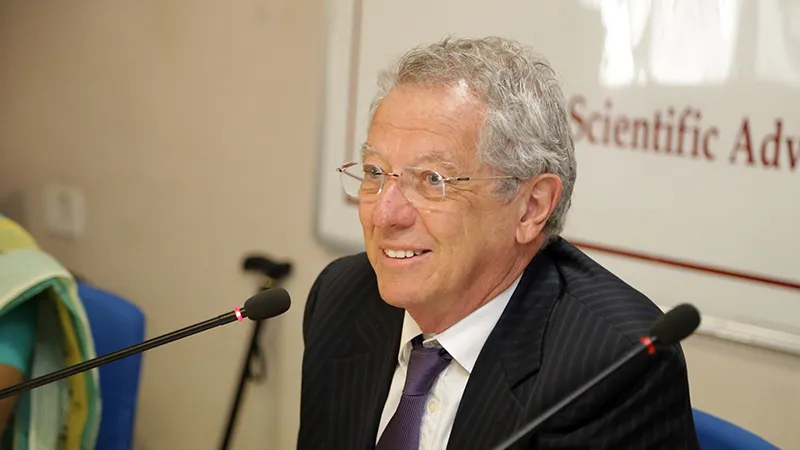-
CENTRES
Progammes & Centres
Location
Britain's former Chief Scientific Advisor and Head of the Government Office of Science, Sir David King, has said that both India and China should take a leadership role at the global platform for Climate Change.

Britain’s former Chief Scientific Advisor and Head of the Government Office of Science, Sir David King, has said that both India and China should take a leadership role at the global platform for Climate Change.
Delivering a talk titled "Has climate science failed the global agreement on climate change?" at Observer Research Foundation on May 1, 2013, Sir David King expressed doubts about the US or UK’s leadership role at the global negotiations on climate change.
He said the future of civilisation is going to be defined through India and China, the countries having the biggest share of middle class population. He said the population growth is no longer an issue now, but the growth of the middle class and its consumption behaviour and desires is an issue and 90 per cent of that growth is from the Asia Pacific region.
Sir David King called for equitable way forward by aiming for carbon di-oxide emission allowance of two tons per person per annum by 2050 by the economies.
Noting that countries are going to the negotiations like the Copenhagen process without setting their commitments towards climate change and ensuring its implementation which gives the benefit of least impact on these countries, Sir David King said the climate change problem can never be solved this way. v By giving the example of the Italian economy where increased cost of imported crude oil account for 100 per cent of the trade deficit, Sir David King suggested that high dependence on crude oil at whatever the price puts a severe impact on the economy, like in India.
Sir David King shared his experiences of developing the climate change policy for Britain right from introducing carbon trade process in Britain and then subsequently to the European Union; introducing Renewable Purchase Obligations to the grid and then the introduction of New Building Regulations which is stretched every three years. By 2017, every new building coming up in Britain can demand no net energy from the grid, he noted.
Talking about Britain’s commitment of 80 percent reduction in carbon di-oxide emissions by 2050, Sir David King said that in order to drive those changes through, Britain realised the need for changing regulatory systems. He said Britain has Department of Energy & Climate Change with the decision making on energy policy and climate change policy under the control of one secretary of state.
He said to implement these commitments, parliament has decided to set up a climate change committee up to 2028with the view of establishing carbon budgets on a four-yearly basis. Going by the example of Britain’s adaptation programme, he suggested public private sector engagement in research, development and demonstration of low carbon technologies for the development of renewable energy.
Chairing the talk, Mr. Mukul Sanwal, former UNFCC Coordinator, in his remarks, said that India is struggling to generate strategic knowledge on the climate change and link the social and the natural sciences to try to anticipate what would happen at the micro level. How India looks at the global interactions and what it does nationally is the major issue today for policy makers, he said.
(This report is prepared by Akhilesh Sati, Programme Manager, Observer Research Foundation, Delhi)
The views expressed above belong to the author(s). ORF research and analyses now available on Telegram! Click here to access our curated content — blogs, longforms and interviews.